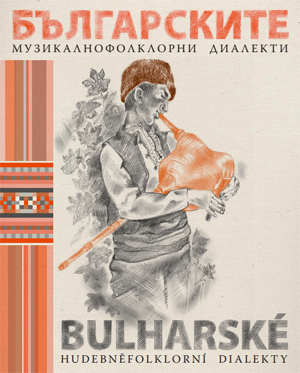Assoc. Prof. PhD Veselka Toncheva is among the foremost contemporary scholars in ethnology, traditional rites and customs and musical anthropology. She works at the Institute of Ethnology and Folklore Studies with an Ethnographic Museum at the Bulgarian Academy of Sciences and has written articles, monographs and screenplays for films focused on folklore. She explores the musical traditions of minorities in Bulgaria, and of Bulgarian communities abroad. Some ten years ago while on a specialization at the Institute for Folk Music Research and Ethnomusicology at the University of Music and Performance Arts in Vienna, Austria, Assoc. Prof. Toncheva worked on a project entitled “The Bulgarians in Vienna – musical folklore and national identity.” She devoted more than a decade to research of the Bulgarian communities in Albania. In the series “The Bulgarians from Golo Bardo, Albania” she presented the history, religion and musical identity of our compatriots there. Veselka Toncheva’s studies have become a factor for the official recognition of the Bulgarian minorities by the Republic of Albania. In the recent years in cooperation with Czech institutions, she has been releasing bilingual books featuring Bulgarian folklore.
 “A very interesting edition that I have authored was released last year”, Assoc. Prof. Toncheva says. „Bulgarian folk musical dialects” was written at the initiative of the Czech society “Zaedno” (Together) uniting the Bulgarians living in the Czech Republic. The key motivator of the project is Sevda – a Bulgarian artist married to a Czech husband who wants her children to learn more about Bulgarian folklore. This is far from our first project. Two years ago, again at the initiative of Sevda, we released as thematic bilingual issue of the Czech children’s journal “Kamaradi”. We presented Bulgarian humorous folk songs with lyrics and sheet music. I wrote the commentaries to them. This was followed by the publication “Bulgarian traditional holidays”. Sevda’s idea was to support Bulgarian parents who would regularly open this book and read it together with their children.”
“A very interesting edition that I have authored was released last year”, Assoc. Prof. Toncheva says. „Bulgarian folk musical dialects” was written at the initiative of the Czech society “Zaedno” (Together) uniting the Bulgarians living in the Czech Republic. The key motivator of the project is Sevda – a Bulgarian artist married to a Czech husband who wants her children to learn more about Bulgarian folklore. This is far from our first project. Two years ago, again at the initiative of Sevda, we released as thematic bilingual issue of the Czech children’s journal “Kamaradi”. We presented Bulgarian humorous folk songs with lyrics and sheet music. I wrote the commentaries to them. This was followed by the publication “Bulgarian traditional holidays”. Sevda’s idea was to support Bulgarian parents who would regularly open this book and read it together with their children.”
Assoc. Prof. Veselka Toncheva also said that the latest edition – „Bulgarian folk musical dialects”, is written in a simple language to allow Czech children and their parents too to come to know the diversity of Bulgarian folklore. It features Bulgaria’s different regions simultaneously in Bulgarian and Czech and consists of 24 folk songs with lyrics and sheet music including “Are you a tulip or hyacinth”, “Donka was weaving aprons”, “Beautiful, you are, girl” and others. The idea is to help children of mixed marriages to learn more about their origin especially nowadays when they live in a global, multilingual environment. The edition offers beautiful illustrations made by Sevda and the texts summarize the studies of a few Bulgarian scholars. The booklet about folklore regions includes detailed bibliography – priceless information for anybody who is keen on research.
“One of Bulgaria’s earliest musical folklorists Vasil Stoin collected in volumes thousands of songs at the beginning of the 20th Century”, Assoc. Prof. Veselka Toncheva went on to say. “In 1981, his daughter Elena Stoin published her study “Folk musical dialects in Bulgaria”. Let me explain –based on an analogy with the dialects of a language we have used the term “folk musical dialects”. The main division is into western and eastern dialects. Nikolay Kaufman, Stoyan Dzoudzhev and Todor Dzhidzhev have also worked in this area. Our foreign colleagues are surprised to find out how very diverse samples of musical folklore we have in a relatively small territory. This wealth summed up in a book has already attracted interest. The edition is distributed free and has already sold out in the Czech Republic. It has been financed by the Ministry of Culture of the Czech Republic and enables minorities to create their own cultural product, promote their culture and work to the benefit of their identity. Although it is not distributed in Bulgaria, anybody who is interested can have the book’s electronic version. I am convinced that it is important to work to the benefit of Bulgaria both at home and beyond its borders.”
English Daniela KonstantinovaThe resort towns along Bulgaria’s Black Sea coast can be broadly categorized into two types: modern ones, characterized by their lively and colorful streets, and port cities with a rich history. Various settlers have passed through these port towns,..
The 14th World Folklore Championship, "World Folk 2024" , starts today and runs until August 30 at three locations on Bulgaria's Black Sea coast: Nessebar, Sunny Beach and Sveti Vlas. The event kicks off tonight at the Jana Chimbuleva Amphitheatre in the..
Esther Willems from the Netherlands continues to attract people from different cities and nationalities to her club for Bulgarian folk dances, established in The Hague and named "Zora". It was founded in 2017 and then 13 people..
Halva, this sweet temptation with an oriental twist, is a welcome delicacy on the Bulgarian table, especially on holidays. Judging by the descriptions of..

+359 2 9336 661
